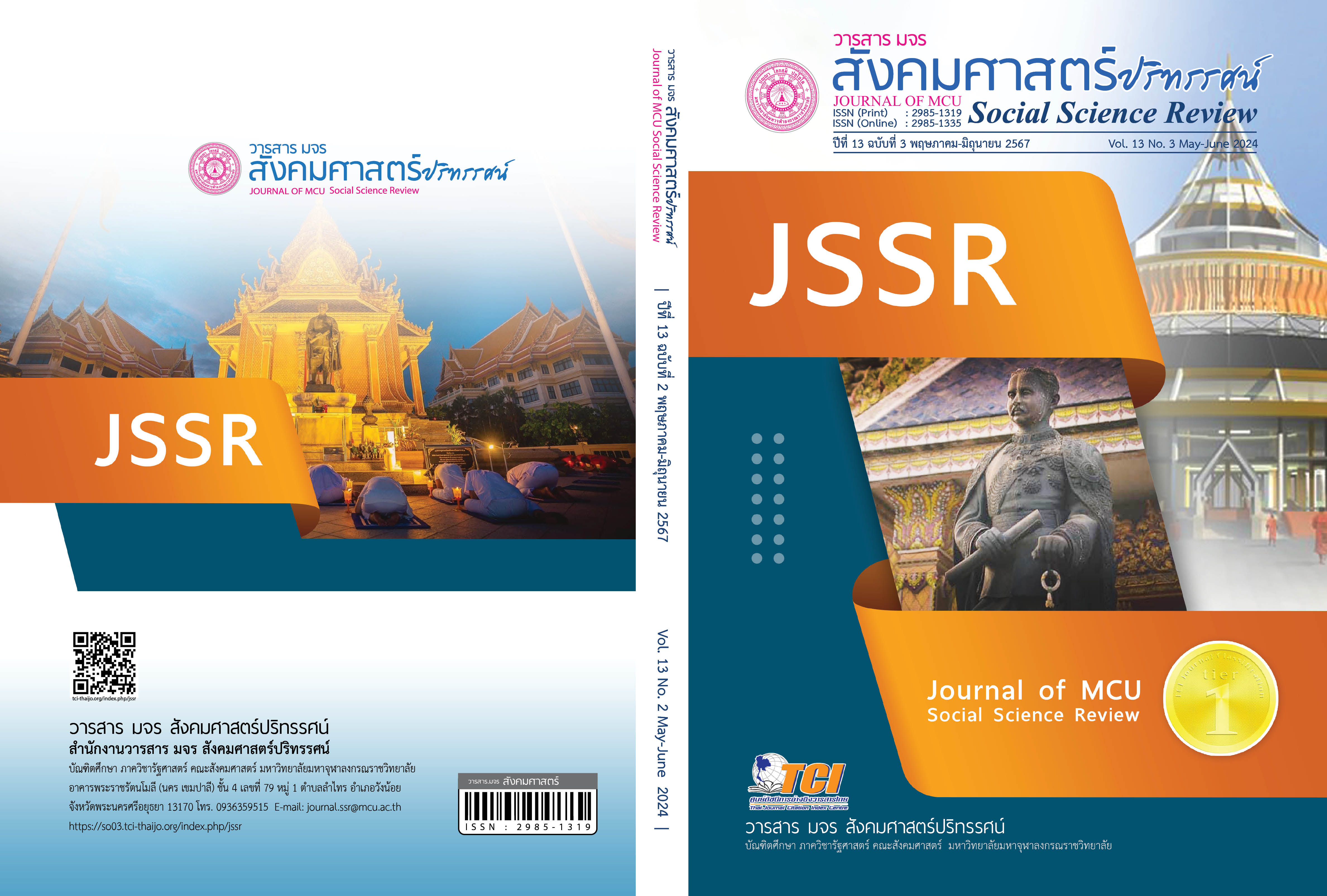การพัฒนาศักยภาพเยาวชนไทยสู่ความเป็นพลเมืองดิจิทัลในสังคมวิถีใหม่
คำสำคัญ:
การพัฒนาศักยภาพ, เยาวชนไทย, พลเมืองดิจิทัล, สังคมวิถีใหม่บทคัดย่อ
บทความวิจัยนี้มีวัตถุประสงค์ 1. ศึกษาการพัฒนาศักยภาพเยาวชนไทยสู่ความเป็นพลเมืองดิจิทัล 2. พัฒนาหลักสูตร e-Learning การพัฒนาศักยภาพเยาวชนไทยสู่ความเป็นพลเมืองดิจิทัล 3. ทดลองใช้หลักสูตร e-Learning กับนักเรียนระดับมัธยมศึกษาปีที่ 3 โรงเรียนอยุธยาวิทยาลัย จังหวัดพระนครศรีอยุธยา เป็นการวิจัยแบบผสมวิธี ด้วยการวิจัยเชิงคุณภาพโดยการสัมภาษณ์ชิงลึก และการวิจัยกึ่งทดลองแบบกลุ่มเดียววัดผลก่อนและหลังการทดลอง เครื่องมือประกอบด้วย แบบสัมภาษณ์เชิงลึก แบบประเมิน และหลักสูตร e-Learning วิเคราะห์ข้อมูลเชิงคุณภาพด้วยการวิเคราะห์เนื้อหา และวิเคราะห์ข้อมูลเชิงปริมาณด้วยสถิติ ค่าความถี่ ร้อยละ ค่าเฉลี่ย ส่วนเบี่ยงเบนมาตรฐาน และค่า t-test แบบ dependent
ผลการวิจัยพบว่า 1. การพัฒนาศักยภาพเยาวชนไทยสู่ความเป็นพลเมืองดิจิทัลในสังคมวิถีใหม่ มีองค์ประกอบดังนี้ 1.1 สถาบันครอบครัว ดูแลและเป็นแบบอย่างที่ดี 1.2 สถาบันการศึกษา การจัดหลักสูตรการเรียนรู้ บ่มเพาะค่านิยมทางสังคม เศรษฐกิจ การเมือง และศาสนา 1.3 พัฒนาทักษะความเป็นพลเมืองดิจิทัล ได้แก่ การรักษาอัตลักษณ์ที่ดีของตนเอง การรักษาข้อมูลส่วนตัว การคิดวิเคราะห์อย่างมีวิจารณญาณ การจัดสรรเวลาหน้าจอ การรับมือกับการคุกคามทางโลกออนไลน์ การบริหารจัดการข้อมูลที่ผู้ใช้งานทิ้งไว้บนโลกออนไลน์การรักษาความปลอดภัยของตนเองในโลกออนไลน์ และการใช้เทคโนโลยีอย่างมีจริยธรรม 1.4 เครื่องมือที่มีประสิทธิภาพประกอบการจัดการเรียนรู้ 2. พัฒนาหลักสูตร e-Learning ประกอบด้วย 3 ชุดการเรียนรู้ คือ 1. ความรู้ทั่วไป 2. ทักษะมุมมองการรู้เท่าทันตนเอง 3. ทักษะมุมมองการรู้เท่าทันผู้อื่น 3. ผลการทดลองใช้หลักสูตร e-Learning พบว่า นักเรียนมีความฉลาดทางดิจิทัลหลังเรียน สูงกว่าก่อนเรียนอย่างมีนัยสำคัญทางสถิติที่ระดับ .01
เอกสารอ้างอิง
กระทรวงเทคโนโลยีสารสนเทศและการสื่อสาร. (2559). แผนพัฒนาดิจิทัลเพื่อเศรษฐกิจและสังคม. กรุงเทพฯ: กระทรวงเทคโนโลยีสารสนเทศและการสื่อสาร.
กาญจนา เดชสม และรุ่งชัชดาพร เวหะชาติ. (2564). การพัฒนาความเป็นพลเมืองดิจิทัลของนักเรียนในศตวรรษที่ 21. วารสารมหาวิทยาลัยพายัพ, 31(1), 151-163.
กุลชาติ พันธุวรกุล และเมษา นวลศรี. (2562). เด็กปฐมวัยกับการเป็นพลเมืองดิจิทัล: โอกาสหรือความเสี่ยง. วารสารครุศาสตร์ จุฬาลงกรณ์มหาวิทยาลัย, 47(2), 1-23.
ชูชิต ชายทวีป และคณะ. (2565). ทักษะความเป็นพลเมืองดิจิทัลของนักศึกษาในสถาบันอุดมศึกษาเอกชน. Sisaket Rajabhat University Journal, 16(3), 147-160.
ปิยะพงษ์ ธรรมรักษ์. (2563). การพัฒนาความฉลาดทางดิจิทัลของนักเรียน ระดับชั้นมัธยมศึกษาปีที่ 4 โรงเรียนสกลราชวิทยานุกูล โดยการจัดการเรียนรู้แบบห้องเรียนกลับด้านร่วมกับ การเรียนรู้แบบไมโครเลิร์นนิ่ง (วิทยานิพนธ์ศึกษาศาสตรมหาบัณฑิต สาขาวิชา นวัตกรรมการเรียนรู้และการสอน). กรุงเทพฯ: มหาวิทยาลัยศรีปทุม.
พักตร์วิภา โพธิ์ศรี. (2562). บทบาทการศึกษาต่อการพัฒนาความเป็นพลเมืองดิจิทัล. วารสารการศึกษาและการพัฒนาสังคม, 14(1), 15-31.
วรพจน์ วงศ์กิจรุ่งเรือง. (2561). คู่มือพลเมืองดิจิทัล. กรุงเทพฯ: ดิวันโอวัน เปอร์เซ็นต์.
วัชรี มนัสสนิท และคณะ. (2562). การวิเคราะห์องค์ประกอบการรู้เท่าทันสื่อของเยาวชนไทยกรณีศึกษา: เยาวชนในจังหวัดเชียงราย. Humanities, Social Sciences and arts, Silpakorn University, 12(6), 279-299.
สมศักดิ์ วานิชยาภรณ์. (2564). การพัฒนาทักษะด้านดิจิทัลกับการทำงานในยุคชีวิตวิถีใหม่ (New Normal). นครปฐม: มหาวิทยาลัยราชภัฎนครปฐม.
สุวรรณี ไวท์ และคณะ. (2564). มนุษย์กับความเป็นพลเมืองดิจิทัล. วารสาร มจร มนุษยศาสตร์ปริทรรศน์, 7(2), 339-355.
อพัชชา ช้างขวัญยืน และคณะ. (2564). การจัดการเรียนเชิงรุกเพื่อส่งเสริมความเป็นพลเมืองดิจิทัล. วารสารศึกษาศาสตร์ มหาวิทยาลัยนเรศวร, 23(3), 452-465.
อุทิศ บำรุงชีพ และคณะ. (2566). การพัฒนาความเป็นพลเมืองดิจิทัลของผู้สูงอายุผ่านนวัตกรรมชุมชนแห่งการเรียนรู้ภูมิปัญญาอาหารสุขภาพ. วารสารวิจัยทางการศึกษา คณะศึกษาศาสตร์ มหาวิทยาลัยศรีนครินทรวิโรฒ, 18(2), 79-94.
อุไรวรรณ ศรีไชยเลิศ. (2566). การพัฒนาระบบประเมินความฉลาดทางดิจิทัลแบบออนไลน์สำหรับนักเรียนชั้นมัธยมศึกษาตอนต้น กรณีศึกษาพื้นที่อำเภอเมือง จังหวัดนครปฐม. Journal of Information and Learning, 34(2), 64-76.
DQ institute. (2020). Digital Citizenship. Retrieved November 23, 2020, from https://www.dqinstitute.org/dq-framework
Kusnadi, I. H. & Hikmawan, M. D. (2020). Digital Cohesion in Era of Pandemic COVID-19 in Indonesia. International Journal of Engineering Research and Technology, 13(7), 1775-1779.
National Association for the Education of Young Children. (2012). Technology and interactive media as tools in early childhood programs serving children from birth through age 8. Washington DC: Fred Rogers Canter for early learning and children’s media.
ดาวน์โหลด
เผยแพร่แล้ว
รูปแบบการอ้างอิง
ฉบับ
ประเภทบทความ
สัญญาอนุญาต
ลิขสิทธิ์ (c) 2024 วารสาร มจร สังคมศาสตร์ปริทรรศน์

อนุญาตภายใต้เงื่อนไข Creative Commons Attribution-NonCommercial-NoDerivatives 4.0 International License.
เพื่อให้เป็นไปตามกฎหมายลิขสิทธิ์ ผู้นิพนธ์ทุกท่านต้องลงลายมือชื่อในแบบฟอร์มใบมอบลิขสิทธิ์บทความให้แก่วารสารฯ พร้อมกับบทความต้นฉบับที่ได้แก้ไขครั้งสุดท้าย นอกจากนี้ ผู้นิพนธ์ทุกท่านต้องยืนยันว่าบทความต้นฉบับที่ส่งมาตีพิมพ์นั้น ได้ส่งมาตีพิมพ์เฉพาะในวารสาร มจร สังคมศาสตร์ปริทรรศน์ เพียงแห่งเดียวเท่านั้น หากมีการใช้ภาพหรือตารางหรือเนื้อหาอื่นๆ ของผู้นิพนธ์อื่นที่ปรากฏในสิ่งตีพิมพ์อื่นมาแล้ว ผู้นิพนธ์ต้องขออนุญาตเจ้าของลิขสิทธิ์ก่อน พร้อมทั้งแสดงหนังสือที่ได้รับการยินยอมต่อบรรณาธิการ ก่อนที่บทความจะได้รับการตีพิมพ์ หากไม่เป็นไปตามข้อกำหนดเบื้องต้น ทางวารสารจะถอดบทความของท่านออกโดยไม่มีข้อยกเว้นใดๆ ทั้งสิ้น





